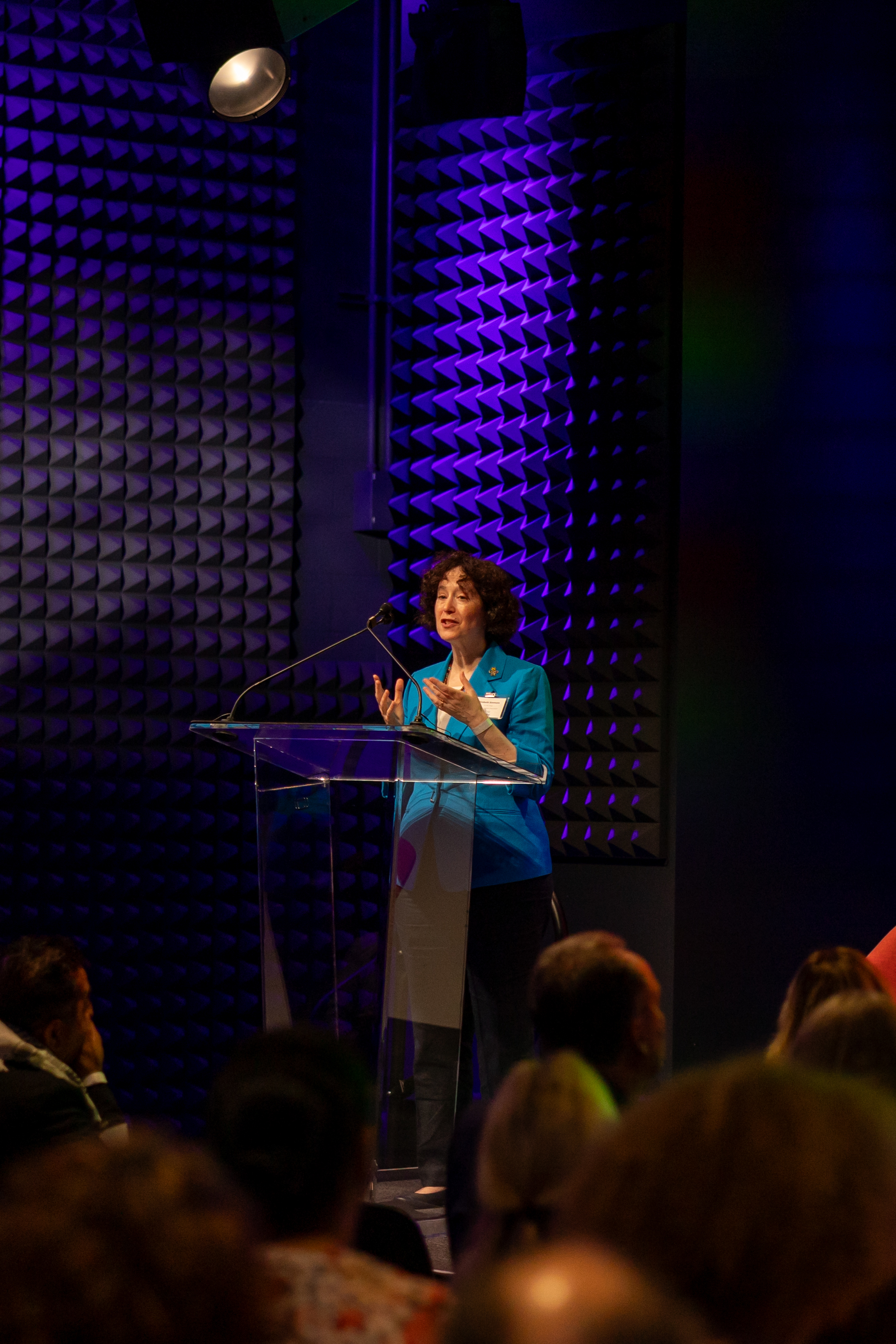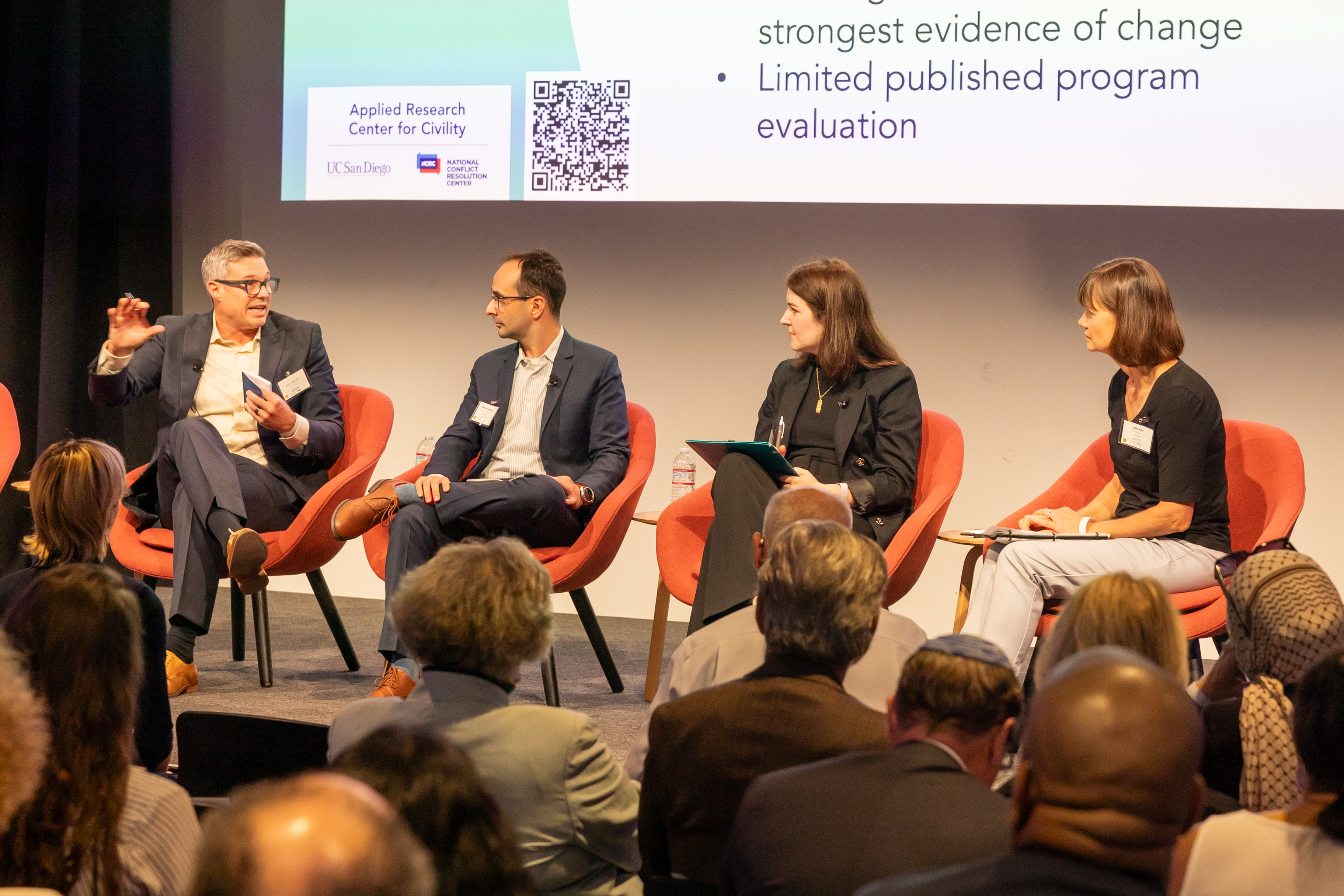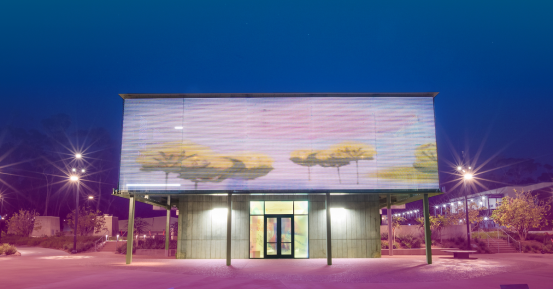Being Purposeful and Brave
The Applied Research Center for Civility—a partnership between UC San Diego and the National Conflict Resolution Center—hosted “Combatting Antisemitism and Islamophobia: Best Practices in Challenging Times.”
Story by:
Published Date
Article Content
Addressing the world’s complex and multidimensional problems requires thoughtful approaches, interdisciplinary collaboration and open dialogue. UC San Diego’s position at the forefront of these efforts was prominent at “Combatting Antisemitism and Islamophobia: Best Practices in Challenging Times,” a two-day conference presented by the Applied Research Center for Civility, a partnership between UC San Diego and the National Conflict Resolution Center.
Held at UC San Diego Park and Market Sept. 22-23, the conference brought together thought leaders from around the country to discuss best practices for addressing religious intolerance, specifically antisemitism and Islamophobia. Experts shared insights, multi-layered strategies and real-world experiences on working toward a better future.

“As a global research university, we have a responsibility to engage with pressing challenges and our reputation allows us to attract experts across various fields,” said UC San Diego Dean of Extended Studies Hugo Villar. Villar moderated a panel at the conference and oversees the university’s Center for Research and Evaluation, which presented a draft of an impact paper on combatting antisemitism and Islamophobia. “UC San Diego's involvement in these discussions reflects our unwavering commitment to positively impacting society and addressing critical societal issues. By elevating public awareness of these pressing issues, the conference plays a crucial role in informing and engaging the community.
The conference was co-hosted by world-renowned leaders in cross-religious and cross-cultural dialogue: Imam Abdullah Antepli, an associate professor at Duke University, and Ken Stern, the director of the Bard Center for the Study of Hate. They opened the conference by reflecting on the current states of religious intolerance, polarization and extremism and the road ahead.
“At the end of the day, people are primed to fear the ‘them’ and see the ‘them’ as people they want to dehumanize,” Stern shared. “People crave simplicity. This work requires nuance, critical thinking, empathy and intellectual curiosity.”
“Hate has a long incubation period,” Antepli added. “As long as they divide and disconnect us, we will not combat hate successfully. Every hate manifests differently and we have to defeat each type of hate differently. I hope this increased attention recognizes we didn’t arrive here in one day and the solution will not be around the corner.”

The Interconnectedness of Hate
Practitioners from community partnerships, civic engagement, higher education and government shared experiences and practical strategies on panels such as “The Impact of Intolerance” and “Interventions to Counter Polarization and Extremism.” A recurring theme emerged: the interconnectedness of antisemitism, Islamophobia and other forms of extremism.
Petra Alsoofy, senior outreach and partnerships manager at the Institute for Social Policy and Understanding, emphasized the importance of building coalitions. “All of these issues are interconnected. We need to be purposeful and brave to challenge them all.” Hurunnessa Fariad, director of outreach at the Multi-Faith Neighbors Network added, “Advocacy should be inclusive. Innately, we’re not made to desensitize ourselves to violence.”
Panelists stressed that hateful beliefs often develop long before intolerant behaviors. Brette Steele, president of the Eradicate Hate Global Summit, highlighted the role of community in preventing the spread of hateful rhetoric: “If your goal is to change behavior, it can be less productive to call them out. Get them help, have a conversation and focus on what will be most effective to change that behavior.”
Leading with compassion when addressing hateful beliefs is imperative, said Patrick Riccards, CEO of Life After Hate. ”If we start from a place of condemnation,” he said, “they fall deeper into the ideology.” Brian Hughes, co-founder and associate director of the Polarization and Extremism Research Lab at American University, emphasized the role of face-to-face connection: “Body language and subtle changes are ways we express care, empathy, concern and compassion and that doesn’t happen online.”
Panelists underscored the need to focus on in-person connection; they noted that people are more likely to trust those within their own communities, and this requires working hand-in-hand with organizations that directly serve the community. Southern Poverty Law Center’s Rachel Carroll Rivas noted, “Spending our time in online spaces is not going to get it there; the community knows exactly what’s happening to them. If we do not focus on community-formed research, we’re going to miss the intolerance.”
A Cross-Pollination of Strategies
The conference culminated in breakout sessions, which fostered more intimate discussions among participants and provided the space to share personal experiences and practical strategies for addressing the beliefs and behaviors of intolerant individuals.
“A cross-pollination of strategies happens through an exchange of knowledge among experts and organizations who come together to share their ideas and best practices,” noted Villar. “This fosters innovation and can lead to more effective solutions.”
The conference acknowledged that a single prescriptive solution to combat religious intolerance is impossible and evidence-based approaches are required to develop lasting solutions. “We didn’t arrive here in one day,” Antepli shared in his conference-opening remarks, “and the solution will not be around the corner.”
“This conference is a crucial step in a long-term process of education, understanding and action aimed at creating more inclusive and respectful societies,” said Villar. “The Center for Research and Evaluation is dedicated to contributing to this evidence-based paradigm. Through comprehensive studies and evaluations, we support the development of more effective methods to combat antisemitism, Islamophobia and other forms of discrimination.”
UC San Diego's involvement in these discussions reflects our unwavering commitment to positively impacting society and addressing critical societal issues.
Share This:
You May Also Like
Stay in the Know
Keep up with all the latest from UC San Diego. Subscribe to the newsletter today.




